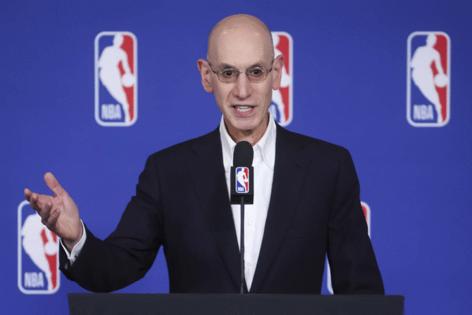Editorial: The NBA has a gambling problem. So does America
Published in Op Eds
“There’s nothing more important to the league and its fans than the integrity of the competition.” So says Adam Silver, commissioner of the National Basketball Association.
He was referring to dual indictments unveiled Oct. 23, which alleged that NBA players and coaches had disclosed nonpublic team information to a criminal gambling ring; engaged in wire fraud and money-laundering conspiracies; and participated in rigged poker games that involved elaborate cheating technology, an assortment of hustlers, four Mafia families and a bouncer known as Albanian Bruce. “Integrity” isn’t the first word that comes to mind.
Since the Supreme Court opened the U.S. gambling market in 2018, 39 states and counting have legalized sports betting to varying degrees. Americans made about $150 billion in legal wagers last year, up from $13 billion in 2019. Nearly half of young men have an active gambling account. Unfortunately, as the NBA’s dustup shows, this experiment is turning out to be a terrible bet.
Criminality aside, the social effects of widespread wagering are alarming. One study found that the legalization of online sports gambling in a given state is associated with deteriorating credit scores and rising bankruptcy rates, debt collections and auto-loan delinquencies. Another found rising credit debt and bank overdrafts. There may even be a link to domestic violence.
The pairing of gambling and smartphone technology has proved especially pernicious. Even casual punters find themselves beset by texts, emails, push notifications, in-game ads and other prompts, while the sports books — like any casino company — fine-tune their offers to keep everyone coming back: Less than 5% of gamblers withdraw more money from their apps than they deposit. It’s no surprise that indicators of addiction are soaring.
All this — debt, addiction, desperation — has an obvious appeal for organized crime. But the industry worsens matters by offering so-called prop bets on the performance of individual players. Such wagers are a standing invitation to corruption: NBA players Jontay Porter and Terry Rozier are both accused of removing themselves from games to capitalize on props. (Rozier has denied wrongdoing; Porter pleaded guilty last year to wire fraud conspiracy.) For unpaid college athletes, the temptations may be worse.
With so much money coming in — to gambling companies, to sports leagues, to state governments — this genie won’t be rebottled anytime soon. Yet public support for gambling is waning quickly. Policymakers should pay attention and seek to make sports betting fairer, less harmful and less prone to manipulation.
At a minimum, prop betting on college sports should be banned, as the National Collegiate Athletic Association has explicitly urged. For pro leagues, sports books should be required to limit props to prominent athletes, void them if a key player’s injury or participation status is in doubt, and subject them to minimum statistical thresholds (i.e., only over a full game rather than a quarter).
Lawmakers should also do more to break the mobile-gambling doom loop. Banning push notifications and restricting the use of artificial intelligence to customize offers would be a start. Ideally, wagers should have to be placed in person, at a casino or similar venue. States will experiment with various other approaches, but the goal should be simple: Make it harder to place impulsive bets.
Finally, sports leagues need to accept more responsibility of their own. In the NBA, for instance, insider information — about injuries, “load management” decisions, tanking — appears to have been routinely exploited for corrupt purposes. If the league wants to continue its partnerships with the likes of DraftKings and FanDuel while maintaining its credibility (sorry, “integrity”), it needs to make a serious effort to protect such information. If it doesn’t, it should expect further attention from the Justice Department.
As with any vice, gambling is fun while the good times roll. But the bill — for the country as for the chancer — always comes due.
____
The Editorial Board publishes the views of the editors across a range of national and global affairs.
_____
©2025 Bloomberg L.P. Visit bloomberg.com/opinion. Distributed by Tribune Content Agency, LLC.
























































Comments